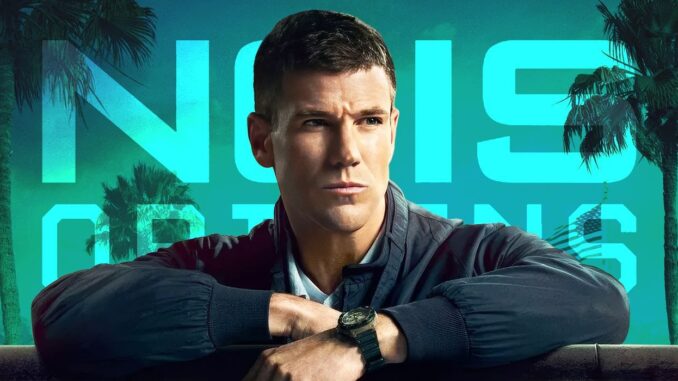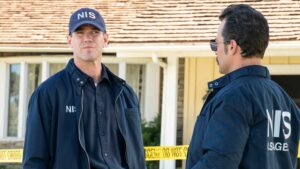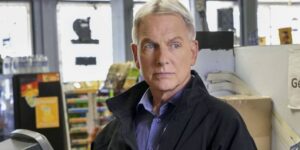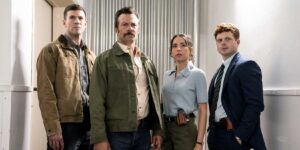
CBS’ NCIS: Origins follows Leroy Jethro Gibbs (Austin Stowell), a character fans have come to know and love since he first appeared in the flagship NCIS in 2003, with Mark Harmon bringing him to life. Only in this 1991-set series, it’s a Gibbs at the start of his career at Naval Investigative Services operating out of Camp Pendleton, and all eyes are on him as he struggles to overcome grief after the loss of his wife and daughter. He’s on shaky footing with the team that’s been put together by Mike Franks (Kyle Schmid), who’s keeping an eye on Gibbs, but his instincts are quickly proving to be useful as they work cases together.
During this one-on-one interview with Collider, Stowell talked about the incredible support he’s received when it comes to stepping into this iconic TV role, why the first week did not feel like any other project he’s ever been on, studying the mannerisms of Harmon to figure out what to incorporate into his performance, the ongoing process of making the character his own, finding the rhythm of the team, the emotional impact of grief, and how Gibbs will have to learn to love himself before being able to move on.
‘NCIS: Origins’ Austin Stowell Has Received Tremendous Support In Stepping Into This Iconic Role

AUSTIN STOWELL: The machine that is CBS and Paramount is so incredibly impressive. I have never had that kind of support and care and dedication from a production standpoint. It’s the talent level of not just the cast and not just the writers, but everybody from catering to grips and even special effects on set. If we’re watching an interrogation in the scene, we’re watching the interrogation in the scene. We actually have the screen with the audio, which is so unique. It’s so useful for actors because you’re reacting to what actually happens. I’ve never had that before. Not that I mind miming. Acting is about how all the world is a stage, wherever you are. But the fact that we have the real footage to watch and to react to is incredible. I’ve never had that before. You really feel that wave of support and help, and it makes your job all the easier, as an actor.
You’re doing a series that’s part of a hugely popular franchise that also got a straight to series order, which is very rare these days. Walking into the first day, yes, it’s a new show, but it’s part of something that has a proven track record of success.
STOWELL: It did not feel like the first week of any project I’ve ever been on. It felt like we’d been doing it for a while. We found a rhythm, from the top down, and that is a testament to the financial and emotional care that CBS and Paramount have shown through every single scene that we do that. It just feels different. It allows us to do our jobs, all the easier. There isn’t the stress of figuring it out. The preparation and the work that went on behind the scenes, in order for things to go as well as they have, I’m just so incredibly thankful for the work that has been done because it has created an atmosphere for us to do something really special with this show.
What was the first day like? How has it been to figure out how the team works?
STOWELL: It was so nice. This story of Origins is Gibbs joining NIS. It’s not even NCIS yet. The first scene up was Gibbs being introduced to the office, and it was my introduction to the office. It played so well because I didn’t know the space. I wasn’t familiar yet with my desk, the locker room, the rec room, or the kitchen. I was truly getting a tour in the scene. Those were creative choices that I have no doubt (director) Niels [Arden Oplev] and (co-showrunners) David [North] and Gina [Lucita Monreal] made, in order for me to give a performance that is true to the character. That apparent care and dedication allowed us to have this wonderful playground and hopefully gives the audience and fans of the show what they’re looking for.
‘NCIS: Origins’ Austin Stowell Studied Mark Harmon To Incorporate Some of His Mannerisms Into Gibbs

It feels like you could probably find yourself down in an endless rabbit hole, trying to figure out like who this version of Gibbs might be. How do you work that out for yourself, so that you can make the character your own?
STOWELL: The Gibbs that I’m playing doesn’t know that Gibbs. I’ve tried to study the mannerisms and the things that Mark Harmon does that has made this character iconic. It’s the stares, it’s the looks, it’s his internal dialogue. That’s what I’ve taken away the most. It’s the amount of thinking and listening that Gibbs does. His observation of the people and the world around him has opened my eyes, as a human being and as an actor, to hopefully step into those very large shoes and fill them.
Do you feel like you’ve been able to make him your own yet, or is that an ongoing process?
STOWELL: He becomes more a part of me, all the time. I think that journey never stops, with any character. It’s not like, at any point in my creative process, I go, “Okay, I’m fully this character now.” That’s the joy of being an actor. You always have another scene. There’s always more to learn from the character, and it’s only revealed to you, especially in television, as you get the scripts. I know where it’s going, but the Gibbs that the audience knows right now, that NCIS fans know, is a guy who has all the answers and who feels very confident. He’s the star of the show and is always in the right place at the right time, all the time. That’s not our Gibbs.
This is someone who’s just lost his wife and child. They’ve been murdered. By the time he gets home from military service, they’re already in the ground, so he has not had a chance to say goodbye. This is someone who is completely broken, who has had their entire life flipped upside down, and is trying to find his footing and his identity now, without them. So much of the life that he probably thought he was going to live is gone. That’s where Franks comes in. He’s given this opportunity through Franks and he’s trying to get back on his feet. This is not going to be a Gibbs that we find steady. It’s not going to be that, in the first few episodes, he finds himself. This is going to be a long journey with him to discover his own abilities and his own talents and being able to trust them.
When you experience something like he has, that’s not something you ever truly get over.
STOWELL: Most people have experienced loss, so that’s something I can connect to. It’s something that, as an actor, I can touch upon and bring to this role. It’s a universal theme. I think that’s what has drawn people to the show and to Gibbs, for a long time. They see part of themselves in him and are able to root for him in such a genuine way because they’re actually rooting for themselves. They’re cheering themselves on, as they watch Gibbs.
‘NCIS: Origins’ Is Balancing the Case of the Week With the Emotional Journeys of the Characters

Is it fun, as an actor, to have that emotional side to explore, especially in a case-of-the-week procedural?
STOWELL: Absolutely, that’s the joy of being an actor. I consider it a selfish act because it’s therapy. We get to push the buttons of emotions that most people keep bottled up, whether it’s anger, elation, sadness, grief, pride. These are things that most of us walk around, day to day, bottling up. And even when they do come out, they’re in small sips, as an actor. You’re rarely dealing in the world of calm waters. It’s always the extremes. That’s what makes storytelling so much fun. It wouldn’t be very much fun if the three little pigs’ houses didn’t come down. You need drama. You need a problem. I don’t know if it’s fun, but I would call it a privilege. It’s a wonderful privilege to exorcise those emotions on nearly a daily basis. It has helped me, as a human being and as a man, become a better son, a better brother, and a better friend. I always knew I wanted to be an actor, and it’s because of that desire to let out those emotions.
When you were envisioning what being an actor might be or what your career could be, what were the kind of roles you thought of, for yourself?
STOWELL: I grew up falling in love with characters like Marty McFly, Frank Bullitt, Indiana Jones, and Zack Morris. Those are the characters that I emulated, not as an actor, but I wanted to be like them in life. And so, when acting became an option for me to create a livelihood for myself, it was that idea, thinking back on myself as a kid and as a young man, and I went after characters that I thought younger versions of myself would admire. If I could ever be that for someone else, to pass along that gift of inspiration, to be a stronger, better human being, that’s the coolest thing going.
Acting is always about finding a middle ground between the jobs you’d like to do and what people will make available to you.
STOWELL: I made a decision, early on, with my agent, to never chase money. I’m never gonna take jobs for money. I’ve already been broke as a joke. I still had all the love in the world, and that made me the richest man in the world, so I knew I was gonna be okay, no matter what. Hitting rock bottom like that gave me the courage and the fearlessness to just go for it, all the time. I don’t know whether that’s naivete or ignorance or lack of reality because bills are bills, but that creative decision for us, as a team, to always go after characters and stories has led me to where I am today, so I think we did something right. I always had confidence that, if I stayed true to myself and to the characters that spoke to me, things would work out. I can see now that that’s what happened. It’s paid off.
There’s nothing normal about the auditioning process. How do you get through it?
STOWELL: Auditioning, to me, has always felt like the acting I did by myself as a kid. It’s your imaginary playground. I used to do things, like shooting hoops in the driveway, and I would narrate and say, “All right, 10 seconds left in the game. He still has the ball.” I truly would do that. That kind of creativity is what goes into the audition room. Now, I’m lucky enough to walk into, as I call our set, the playground and it is phenomenal. Thanks to the builders, the painters and the set decs, it looks like the NIS office at Camp Pendleton. We have 70 yards of playground that’s about 20 yards wide. It’s a world. So many times, when you’re acting, it can be in a small box. You go into the audition room, and you have to create everything yourself. But this job has come to life. That’s the magic. This is the dream.
This is the real good stuff, as an actor. You imagine all this stuff, you run it in your head, you get friends of yours to run the lines with you, and you imagine every little last detail about it all, and then you book the job, and if you’re lucky enough to work for a company like CBS and Paramount, where they back you up, all of a sudden, you open your eyes and you are there with everything around you. That is the most special, magical feeling. That’s where you start to feel like you become the character. Impressive is such an understatement. The amount of effort and time and talent that so obviously has been put to work here is breathtaking. You feel like you’re at Disneyland. It’s that feeling that you are immersed in this world. That’s exactly what it feels like, walking onto the set of Origins.
Gibbs Is Getting To Know the Team at the Same Time Austin Stowell Is Learning About His ‘NCIS: Origins’ Co-Stars
What’s it like to find the rhythm of the team together?
STOWELL: He’s joining their team. We’re getting to know each other, as actors and scene partners. We’re getting to see how we operate between takes. Certain people are chatty while certain people are quiet, and some people like to put in headphones, which are all creative choices. We’re in the learning process right now. It’s easy for me to make that parallel to the character because I am so new to this world. Day one of joining NIS for Gibbs was day one for me of joining NCIS: Origins. The character and I are going through the same thing, in terms of a new chapter of their life, trying to figure out what the struggles are and how to go about easing them, and whether or not it’s a good fit. That’s a real thing for Gibbs, trying to figure out what works. This is not a guarantee for him. Nothing is.
He’s not a leader right now. It’s in him. There are flashes of it. You’ll start to see him be able to trust himself more. There are little drops in the bucket, here and there. It’s gonna be so much fun to let this flower bloom over time, into this rich, complex, admirable character that the world has fallen in love with. Right now, it’s my job to try to figure out how he got there. Probably the best part of this job, in general, is the team. I just cannot tell you how lucky I feel to have the cast around me that I do. They are talented, through the roof. I get to have the best players come to play ball with me, every day. Aside from that, they’re wonderful people, and that was probably the thing I was most nervous about, going into this. You’re walking into what could be the next 10 or 15 years of your life, and it only takes one bad apple. I feel really lucky not to have one of those. It’s a family. Not everybody likes their family. I happen to. I’m looking forward to the holidays right now.
With a show like this, viewers are going to start to think about character relationships and love interests. I’m guessing that Gibbs is not in any sort of place for something like that, at this point. Would you say that’s the case?
STOWELL: Yeah, it’s only four months since losing his wife and daughter, and they were murdered, in his eyes, because of him. So, he’s got to learn how to love himself first before that becomes an option again.